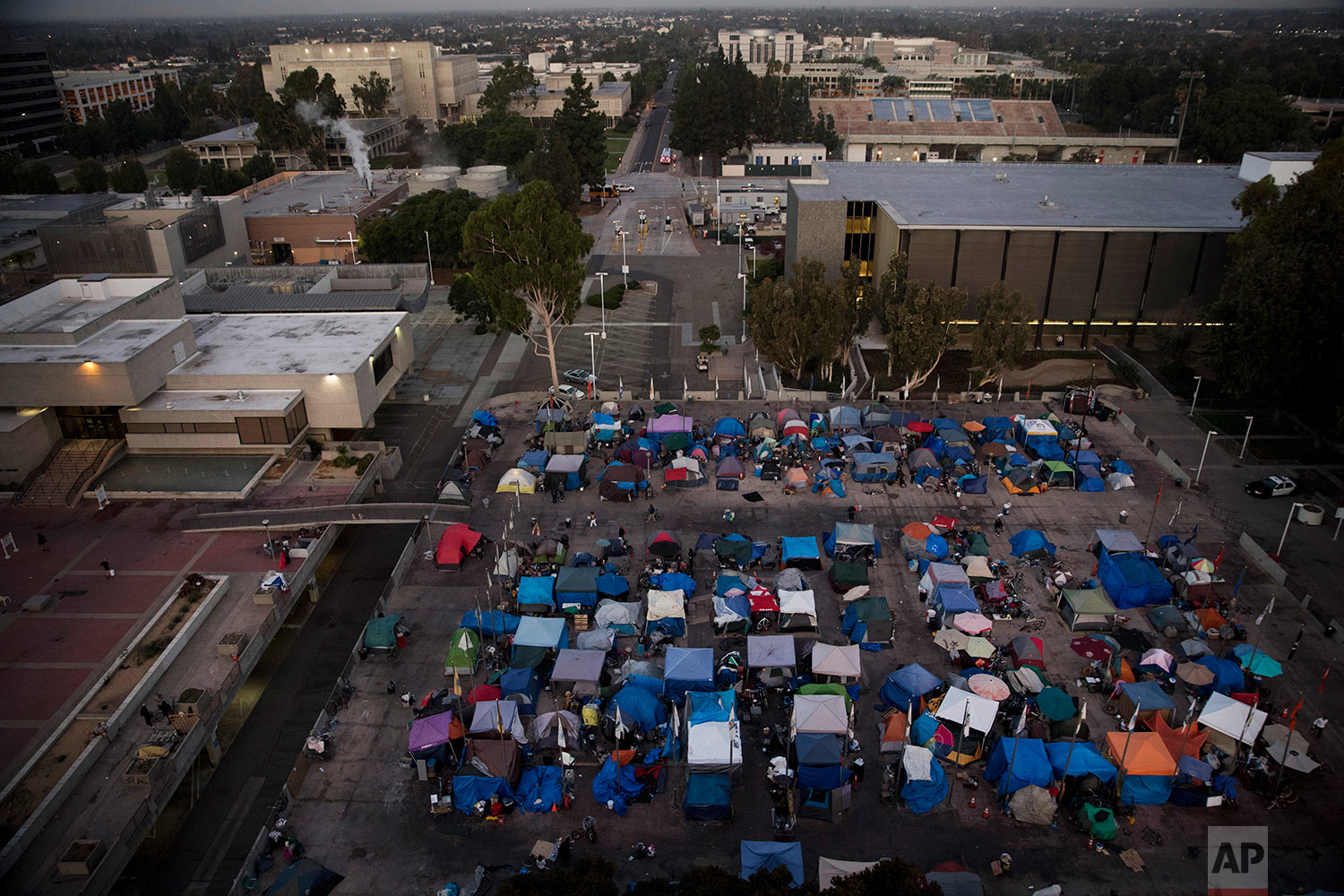Bill targeting homelessness via fines will take effect November 1
Senate Bill 1854 fines homeless people on state land up to $50, allows unauthorized camping to be charged as a misdemeanor, and includes imprisonment for up to 15 days. While first time offenders will receive a warning, a quarter of unhoused people report being arrested for activities that result from their lack of housing, and their likelihood to be arrested multiple times is much higher than the general public.

Oklahoma cities will begin targeting illegal encampments, like the one shown in Santa Ana, Calif., mainly used as refuge by homeless populations (AP Photo/Jae C. Hong)
Delisa Jones runs Second Chances Thrift Store on 2605 N MacArthur Blvd in Oklahoma City, a re-entry center focused on helping people transition from homelessness to stable housing.
“We focus on men and women who are struggling with homelessness, addiction, mental health, men and women who live on the streets that are struggling with human trafficking, sex trafficking, and domestic violence. So our goal every day is to see each of them in their season that they’re standing in, love them, feed them, get them hooked up with case management, put them into safer living situations,” Jones explained.
The homelessness crisis and the criminal justice system are deeply connected, with the unhoused population being more likely to report having a criminal record according to the National Survey. The reverse is also true, with those that have a history of homelessness being overrepresented in incarceration. While homelessness makes one more vulnerable to arrest for crimes like loitering and sleeping in public, being incarcerated decreases the ability to find and keep secure, stable housing.
Second Chances provides resources, assistance, and a listening ear to over 200 people per day.
“If they’re currently living in a camp, then we furnish tents, tarps, and sleeping bags. And depending on the weather, like if it’s super hot, we send cooling blankets. And if it’s super cold, we send, we give them heaters, a portable butane, propane and small heaters. And our goal is to get them reconnected and reacclimated with, um, either getting a job, getting mental health help, or getting them back with their family, friends or children. Just letting them know that, like, I see you. And your circumstances, you know, are not that unique,” Jones said.
In 2018, Valerie Schnieder from Howard University detailed a phenomenon called “The Prison to Homelessness Pipeline.”
Her research showed that when people are released from prison, obtaining secure housing is a crucial point to successfully reenter society and lessen the chances of reoffending.
However, Schnieder wrote that “those with criminal records— a population that disproportionately consists of racial minorities—are routinely denied access to housing, even if their offense was minor and was shown to have no bearing on whether the applicant would be likely to be a successful renter.”
Jones said that someone who wants to assist an unhoused person “can help them first by just getting to know their name and seeing them and maybe bringing them some lunch or something because we know that food brings fellowship and that builds trust.”
The problem can be tackled both on the individual and systemic levels, she explained.
“The shelters are full. Everybody doesn’t have somewhere to go. So just opening up areas that our friends can go to where they’re not going to go to jail because they’re living outside because if they go to jail, they’re going to get released, they’re going to come to Second Chances are another small grassroots ministry like mine, and it’s going to be a repetitive circle of the same thing,” Jones said.
Rep. Chris Kannady, author of the bill, said that this is an alternate method to address homelessness after other approaches have not been as effective as hoped. He stated that if after a year there was no improvement he would repeal the legislation.
“I would encourage everybody, that if you see somebody to stop, sit down with them, have a conversation and see how you can help. They are willing to accept help, and they’re willing to work. And they’re willing to do their best, but they feel so let down,” Jones said. She said that bills like this “punish them for their situation that they can’t control.”
One possible solution Jones pointed out is the availability of buildings that currently stand vacant. “There’s so many vacant buildings that can be turned into something that is so substantial to homelessness and mental health right here,” she said.
The bill, which now just awaits Gov. Kevin Stitt’s signature, will go into effect November 1, 2024.
“This is going to disrupt so many people, and it’s going to cause big problems, it’s going to cause so many problems for our city and for our local businesses, because if they have nowhere to go, they’re going to be in the forefront of the city, disturbing, you know, what’s happening daily, because they’re seeking help. And we’re here to help them. But they need somewhere to lay their head,” Jones said.

